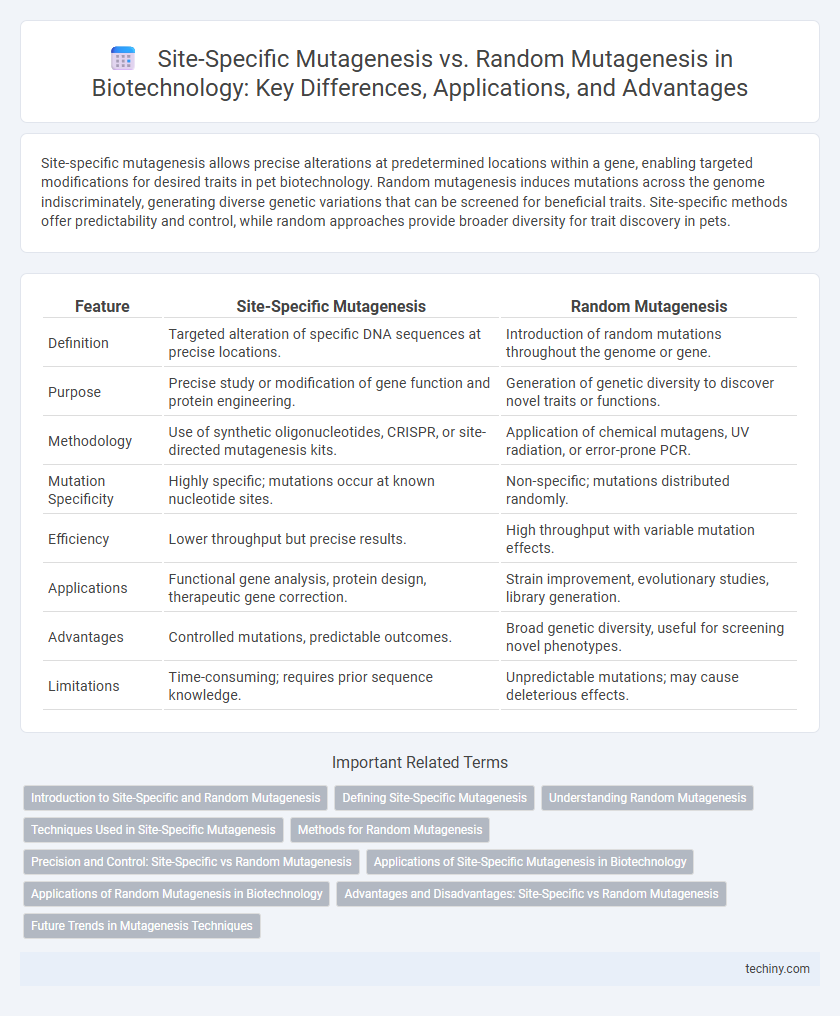Site-specific mutagenesis allows precise alterations at predetermined locations within a gene, enabling targeted modifications for desired traits in pet biotechnology. Random mutagenesis induces mutations across the genome indiscriminately, generating diverse genetic variations that can be screened for beneficial traits. Site-specific methods offer predictability and control, while random approaches provide broader diversity for trait discovery in pets.
Table of Comparison
| Feature | Site-Specific Mutagenesis | Random Mutagenesis |
|---|---|---|
| Definition | Targeted alteration of specific DNA sequences at precise locations. | Introduction of random mutations throughout the genome or gene. |
| Purpose | Precise study or modification of gene function and protein engineering. | Generation of genetic diversity to discover novel traits or functions. |
| Methodology | Use of synthetic oligonucleotides, CRISPR, or site-directed mutagenesis kits. | Application of chemical mutagens, UV radiation, or error-prone PCR. |
| Mutation Specificity | Highly specific; mutations occur at known nucleotide sites. | Non-specific; mutations distributed randomly. |
| Efficiency | Lower throughput but precise results. | High throughput with variable mutation effects. |
| Applications | Functional gene analysis, protein design, therapeutic gene correction. | Strain improvement, evolutionary studies, library generation. |
| Advantages | Controlled mutations, predictable outcomes. | Broad genetic diversity, useful for screening novel phenotypes. |
| Limitations | Time-consuming; requires prior sequence knowledge. | Unpredictable mutations; may cause deleterious effects. |
Introduction to Site-Specific and Random Mutagenesis
Site-specific mutagenesis enables precise alterations at predetermined DNA locations, facilitating targeted changes in gene sequences for functional analysis and protein engineering. Random mutagenesis generates unpredictable mutations throughout the genome, creating diverse genetic variants to explore phenotypic variations and identify beneficial traits. Both techniques are essential for advancing genetic research and optimizing biotechnological applications.
Defining Site-Specific Mutagenesis
Site-specific mutagenesis precisely alters targeted nucleotide sequences within a DNA molecule, enabling researchers to study gene function and protein interactions with high accuracy. This technique contrasts with random mutagenesis, which introduces mutations at unpredictable sites, often generating diverse genetic variants for screening. Site-specific mutagenesis is essential for creating defined mutations that facilitate functional genomics and protein engineering in biotechnology applications.
Understanding Random Mutagenesis
Random mutagenesis generates genetic variants by introducing mutations at multiple, unpredictable locations across the genome, often using chemical mutagens or error-prone PCR techniques. This approach enables the exploration of a vast sequence space to identify novel phenotypes or functions without prior knowledge of gene targets. Despite its stochastic nature, random mutagenesis is invaluable for protein engineering and functional genomics, providing diverse mutant libraries for directed evolution experiments.
Techniques Used in Site-Specific Mutagenesis
Site-specific mutagenesis techniques primarily include oligonucleotide-directed mutagenesis, CRISPR-Cas9 genome editing, and zinc finger nucleases (ZFNs), enabling precise nucleotide changes at targeted genomic loci. These methods utilize engineered nucleases or synthetic primers to introduce point mutations, insertions, or deletions with high specificity. Advances in site-specific mutagenesis improve functional studies of proteins and metabolic pathway engineering by allowing controlled genetic modifications compared to random mutagenesis methods.
Methods for Random Mutagenesis
Random mutagenesis techniques, such as error-prone PCR, chemical mutagenesis using ethyl methanesulfonate (EMS), and ultraviolet (UV) irradiation, introduce unpredictable nucleotide changes across the entire genome or target DNA. These methods generate diverse mutant libraries that are essential for directed evolution and functional genomics studies by enabling the exploration of protein variants with novel or improved properties. High-throughput screening or selection is typically required to identify beneficial mutations among the extensive variants produced by random mutagenesis.
Precision and Control: Site-Specific vs Random Mutagenesis
Site-specific mutagenesis offers unparalleled precision by targeting exact nucleotide sequences, enabling the modification of specific genes with high accuracy and minimal off-target effects. In contrast, random mutagenesis introduces mutations across the genome or a targeted region without predictable sites, generating diverse variants but lacking control over mutation locations. This precision and control distinction makes site-specific mutagenesis ideal for functional studies and therapeutic applications, while random mutagenesis suits exploratory research and directed evolution experiments.
Applications of Site-Specific Mutagenesis in Biotechnology
Site-specific mutagenesis enables precise alterations in DNA sequences to study gene function, protein engineering, and metabolic pathway optimization, offering targeted modification advantages over random mutagenesis. This technique is extensively used in developing improved enzymes for industrial processes, creating genetically modified organisms with desirable traits, and designing proteins with enhanced stability or activity. Its accuracy facilitates the production of biopharmaceuticals and advances synthetic biology applications by enabling predictable and reproducible genetic modifications.
Applications of Random Mutagenesis in Biotechnology
Random mutagenesis in biotechnology is extensively utilized for creating diverse genetic variants to enhance protein engineering, metabolic pathways, and strain development. This technique accelerates the discovery of novel enzyme functions and improved biochemical properties, often leading to optimized industrial biocatalysts and therapeutic agents. Applications include fermentation improvement, drug resistance studies, and adaptive evolution experiments in microorganisms.
Advantages and Disadvantages: Site-Specific vs Random Mutagenesis
Site-specific mutagenesis offers precise control over genetic alterations, enabling targeted modification of specific nucleotides to study gene function or produce desired protein variants with minimal off-target effects. In contrast, random mutagenesis generates a broad spectrum of mutations throughout the genome, facilitating the discovery of novel phenotypes but often requiring extensive screening to identify beneficial changes. While site-specific mutagenesis is efficient for hypothesis-driven experiments, random mutagenesis excels in exploratory applications where the goal is to uncover unexpected genetic variations.
Future Trends in Mutagenesis Techniques
Site-specific mutagenesis is evolving towards CRISPR-based precision editing to enhance genome modification efficiency and accuracy, while random mutagenesis integrates high-throughput screening and machine learning for targeted library optimization. Emerging trends emphasize combining synthetic biology with directed evolution to accelerate enzyme engineering and metabolic pathway redesign. Advances in in vivo mutagenesis platforms also facilitate real-time adaptive evolution in microbial hosts, enabling rapid development of traits for industrial biotechnology applications.
Site-specific mutagenesis vs Random mutagenesis Infographic

 techiny.com
techiny.com